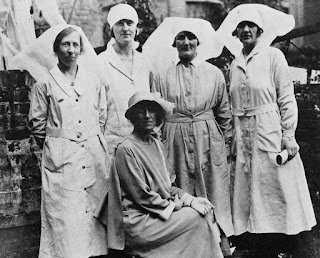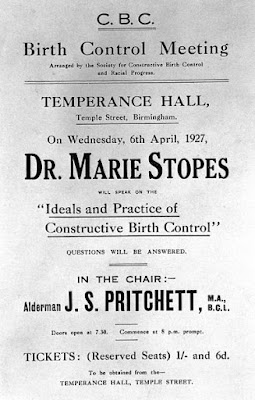Dr Marie Stopes, 1914
Marie Stopes (1880-1958) was born in Scotland, daughter of a leading archaeologist and a literature scholar. In 1902, she graduated with a BSc at the Uni College London in only 2 years, winning the Gold Medal for biology. In her mid-20s, she crawled into hazardous coal mines in Lancashire, collecting spectacular ancient plant fossils. Her labour illuminated the origin of coal, the British Empire fuel!
Her Prof Francis Oliver was progressing in plant evolution. Also passionate for scientific research, Stopes went to the Uni of Munich to study the sexual habits of primitive plants, learned German and earned her PhD in paleo-botany in 1904. And another PhD from Uni College London! Then Stopes became the first female lecturer at the Uni of Manchester.
In 1907 Britain's respected scientific institution, The Royal Society of London, sent Stopes on an 18-month expedition to Japan. She was to solve a problem that had earlier mystified Charles Darwin: the evolutionary origin of flowers. Stopes left for northern Hokkaido Island where she dug up fossils that perfectly addressed Darwin's dilemma.
Stopes was British science’s rising star. In 1910 the Canadian Government invited her to resolve a dispute about the age of New Brunswick rocks. Analysing the Canadian fossils back at the British Museum London, she cut through years of confusion and resolved the dispute! Men were astounded.
In 1911 Stopes married a fellow scientist, Reginald Gates but their disastrous marriage collapsed in a year and was annulled. Also in 1911 she found many books about human sexuality locked in a cupboard at the British Museum. Rifling through, she finally understood Gates’ impotence. She had been an educated scientist who was naïve about her own sex life!!
How did this young palaeontologist change Western society? Stopes became committed to increasing her knowledge of sexual ethics and reproductive physiology. A seminal influence was Havelock Ellis (1859–1939).
She met American pioneer Margaret Sanger in London’s Fabian Hall in July 1915, as later discussed in Sanger’s book My Fight for Birth Control. The rivalry between Stopes and Sanger began when Sanger wanted to open a contraceptive clinic in London, after her newly opened clinic in the US was raided by police.
Stopes’ sad marriage justified her campaign for sexual reform and led to the first sex manual written in the UK, Married Love (1918). But it took another two years before she could find a printer. On the book’s release, Stopes’ fame boomed. Many letters, written by women thanking Stopes for her work, have since been archived.
In 1918, Stopes married Humphrey Roe and happily had a son, Harry Stopes-Roe. Humphrey shared her interest in contraception; as a manufacturing magnate, he had seen the effects unplanned childbearing had on his female workforce.
The success of Married Love was quickly followed by Wise Parenthood, a guide to contraception. Then Radiant Motherhood (1920) and later Enduring Passion. She used physiological terms for the first time in popular works, to give the books gravitas.
Stopes opened the first UK family planning clinic on Mar 1921 in Marlborough Rd North London. The Mothers’ Clinic for Constructive Birth Control was financed by the couple, hiring only female doctors and nurses to make patients more comfortable. The clinic offered a free service to married women, dispensed rubber cervical caps and distributed contraceptives by mail order.
The first London family planning clinic opened in 1921
Photo credit: Marie Stopes: a biography
A mobile contraceptive clinic
Naturally Stopes faced opposition from the Anglican and Catholic Churches and medical community. She responded by distributing pamphlets and making public speeches. In 1923, Catholic Dr Halliday Sutherland libelled Stopes in his book Birth Control. He argued that birth controllers were using the poor for scientific experimentation. Stopes sued Halliday but lost the case amongst bitterly divisive publicity.
In the 1920s Stopes opened other clinics, including in a fully equipped caravan. In 1930 she formed the National Birth Control Council/later Family Planning Association.
University College London Bloomsbury was where the contributions Francis Galton etc made to biometrics, genetics and archaeology were famous. Less well known was their contribution to establishing and legitimising eugenics i.e the science of improving human populations via selective breeding. In fact Galton coined the term eugenics in 1883, the roots of the movement being at UCL, not Nazi Germany.
Stopes was a product of her age, when intellectual life in Britain was already coloured by eugenics. Stopes had been friendly with Francis Galton since childhood, so she joined the Eugenics Education Society early and became a life fellow in 1921.
Poster advertising a public lecture by Stopes, 1927
Stopes advocated for the sterilisation of people seen as unfit for parenthood. Her views were being promoted by the Nazis, so in 1935 she attended a Nazi Congress for Population Science in Berlin. And in 1939 she wrote a gushy personal letter to Adolf Hitler, enclosing her love poetry.
She wanted to improve the quality of Britain’s genetics so she called for new laws that allowed the “hopelessly rotten and racially diseased” to be sterilised and wrote strongly against interracial marriage.
Dr Marie Stopes died from breast cancer in 1958. That year Anglican Bishops at the Lambeth Conference accepted that procreation was not the sole purpose of Christian marriage. Her legacy was represented through the organisation Marie Stopes International which provided reproductive health services to millions of people in 35+ countries.
Thankfully her works on reproductive rights and feminism were heroic. She had defied the churches and the male-dominated medical establishment!!
Her legacy is marked by an English Heritage blue plaque
on her Upper Norwood London home.














.jpg)































.jpg)
















18 comments:
Stopes may have reduced the nightmare of unwanted pregnancies in the 1920s in a Britain, but look now. Women in many countries are imprisoned for using contraception, suffering miscarriages or seeking abortions. Nothing much has changed. Stopes would weep.
I am not sure why an educated, progressive scientist would later support eugenics.
Deb
one review (Guardian 2019) I read said Mozambique, Chad, Cameroon, Kyrgyz Republic, Zimbabwe, Kenya, Ghana, Burkina Faso and Sri Lanka allowed no contraception at all. Timor, Philippines, Haiti, P=New Guinea and Montenegro allow some. But even in other countries, the woman's ability to avoid unwanted pregnancies is in practice reduced by the age of the woman, her ability to pay for the Pill, the permission of her husband etc. Abortion is even more restricted. Dr Stopes' progress was far from universal, clearly :(
Joe
Eugenics, the set of beliefs and practices which aims at improving the genetic quality of the human population, seemed quite progressive originally. And the cause became increasingly promoted by intellectuals of the Progressive Era, who wanted healthier babies, happier mothers and better health care systems. It was only later that eugenicists supported the forcible sterilisation of the black, poor and disabled.
Mind you, Dr Stopes attended a Nazi Congress for Population Science in Berlin, suggesting she fully understood the nastiness of eugenics. Ditto her letters to Adolf Hitler.
Boa tarde. Um tema forte e polêmico. Mais parabéns pelo debate.
She sounds like an amazing woman, even before she began the birth control clinics. What a pity she marred her reputation with eugenics and worse by corresponding with Hitler. Attending a conference in Germany in 1935 is one thing, but communicating with Hitler in 1939 is really too much.
Luiz
it was certainly controversial in the 1920s, but I wonder how influential Dr Stopes' work was in other countries. I know, for example, that plenty of Marie Stopes Clinics opened in Australian cities, but that was decades later.
A most impressive career, I had heard of her but not the paelobotany thing. A pity about her admiration of Hitler! I wonder how she felt during and after the war?
Andrew
The greatest learning happened in German universities and learned institutions, so it didn't surprise anyone that Stopes learned high quality German and did her doctorate at Munich University. She published top quality academic journal articles and presented scholarly papers at conferences.
Her connections with Germany were strong for life. But the University College London's establishing and legitimising eugenics was purely British, not German. And dated way back to when Stopes was still wearing nappies.
Sue
I would not have even known what paleobotany was: the scientific study of ancient plants, using plant fossils found in rocks. Only when paleobotany was seen to be useful in coal and petroleum exploration did ordinary people see the word in print. So the fact that Stopes earned her PhD in paleo-botany back in 1904 impressed me :)
I cannot find anything she said about Nazism after WW2. However note that in 2020 the many Marie Stopes Clinics all changed their names to distance themselves from links Stopes' links to eugenics and Nazis. MSI Reproductive Choices is the name now.
Helen This was in The National Archives
In this 1927 letter, Stopes is writing from her position as President of The Society for Constructive Birth Control and Racial Progress. It was the CBC that was used to administer Stopes’s birth control clinics, and it’s this association with eugenics that has led to Stopes’s controversial legacy today.
In the early 20th century eugenics was more mainstream than it is today, with people from all walks of life, including the aristocracy, the clergy, socialists, conservatives and an array of leading intellectuals supporting its principles. Differing schools of thought had divergent opinions on how eugenics should be applied practically to improve society. Some, such as the Eugenics Society, advocated for the sterilisation of those deemed ‘unfit’.
Many thanks.
I knew the term Racial Progress in her organisation referred to to the theory of eugenics. And I knew Stopes supported eugenics because she and her colleagues thought that the quality of society would go up, once negative genes were eliminated. But I had not thought she would combine contraception and eugenics quite so explicitly in one organisation.
Thank you also for further reading recommendations, and for the location of Marie Stopes’ personal and scientific papers.
Hi Hels - I hadn't picked up on Marie Stopes' other interests ...paleobotany and eugenics ... eugenics I cannot understand. The Paleobotany is really interesting ... she wrote her Phd in German I see ... I did know about her when I was in London in the 1960s/70s ... thanks for this - cheers Hilary
Hilary
when I did psychology back in the 1960s, all the early reading was from important German and British writers. And as feminism crept into our professional and personal lives, I chose to work as a psychologist in contraception, abortion, sterilisation, women's rights and child maltreatment (until 1990). Dr Stopes was an heroic role model.
Bom final de semana com muita saúde e paz minha querida amiga.
Luiz
I hope you are correct. A large hunk of the world has been suffering terribly, over the last few years. We have Federal elections tomorrow which may, or may not, be the start of a healthy and peaceful future.
Last year, conservative Republicans in the Missouri legislature took a run at blocking Medicaid funding from going to Planned Parenthood, a frequent and prominent target of anti-abortion activists and politicians. But in the fine print of their measure, those Republicans revealed that their ambition wasn’t only to target a familiar abortion foe. They were going after specific forms of birth control as well, notably, emergency contraceptives, often sold under the brand name Plan B, and intrauterine devices, known as IUDs. GOP lawmakers tried to stop Missouri’s Medicaid agency from paying for those forms of contraception.
Michael Ollove
PEW
Michael
the outcome for opposing the opening of a family planning clinic in London in 1921 might have been as tragic as banning specific forms of contraception in Missouri in 2022. But I wonder if the motivation was the same.
Post a Comment